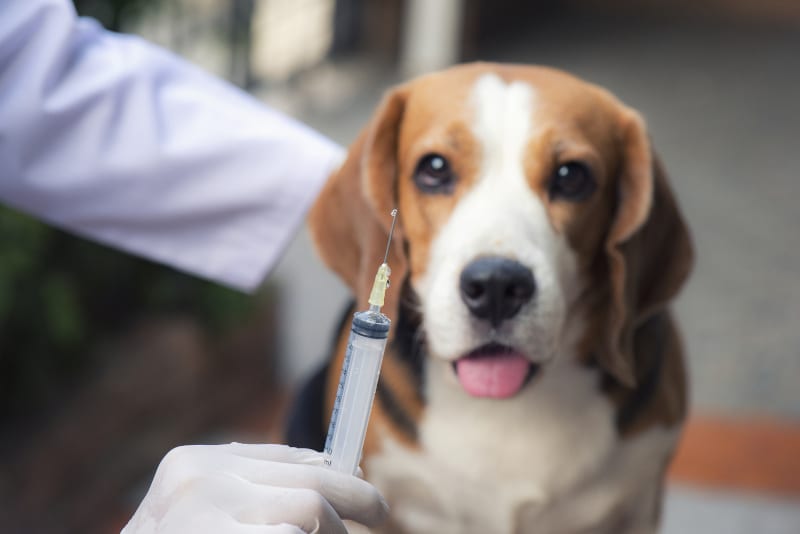
Why Does My Dog Keep Scratching for No Reason in Boston, MA?
Scratching is a common issue among dogs, and it’s especially hard to watch when your dog appears to be very itchy, uncomfortable, and even scratching doesn’t bring any relief. Some breeds are predisposed to “atopic dermatitis,” or itchy skin, such as German Shepherds, French Bulldogs, Labrador Retrievers, and some terrier breeds.

Atopic dermatitis happens because your dog’s immune system goes into “over-drive” in response to the environment, certain foods or other factors, and these factors can cause uncomfortable itchy skin. Chronic scratching can lead to problems with your dog’s skin, as it becomes red and inflamed, and this can set your dog up for secondary infections.
There are several reasons for puritis (itching) and scratching in dogs and some suggestions as to how to best help relieve the cause of scratching in your dog.
Fleas and Ticks
Fleas and ticks have saliva that is very allergenic, so a single flea bite or tick bite can cause inflammation and irritation. Flea bites can cause something called “flea allergy dermatitis” that makes your dog itchy where she was bitten by the flea.
Fleas and ticks usually congregate at well-vascularized areas on your dog’s body, such as the groin area, the armpits, the head, ears and neck. Fleas can also deposit “flea dirt” on your dog, and the flea dirt looks like tiny pepper flakes.
Flea dirt is essentially digested blood, and it can also cause itching. Tick bites can cause secondary bacterial infections that can cause further itching and skin irritation.
You can prevent fleas and ticks by avoiding flea-invested areas such as kennels, wooded areas, doggy daycares or dog parks, or you can consult with your veterinarian as to which flea and tick preventatives are best for your dog. Many flea and tick preventatives are a once-a-month chewable treat, or a once-a-month topical application.
Dog Seasonal Allergies in Boston, MA
Many dogs suffer from seasonal allergies, causing allergic dermatitis, itchy skin and scratching. Depending on the area of the country where you live, the months when these allergies appear can vary, however, seasonal allergies are most common during the spring, summer and fall, but in warmer climates, they can appear all year-round.
Plants, flowers, grasses, weeds and trees that are in bloom are the most common contributors to seasonal allergies. Ways to help relieve your dog’s seasonal allergy symptoms can be done with regular bathing and grooming, using air filtration systems or air purifiers, and limiting the exposure to allergenic environments and plants.
Mange and Itchy Skin for Dogs
Itchy skin can also be caused by mange, and mange is a word for tiny, microscopic mites that burrow into the layers of the skin of your dog. There are two types of mange, Sarcoptic (known as scabies), and Demodex (also known as red mange).
Sarcoptic mange is caused by a round-shaped mite with eight legs, is very contagious, and can be transmitted from dog to dog, and from dogs to humans (although this mite doesn’t really like humans).
Demodex is a cigar-shaped mite, and believe it or not, is a natural occupant of your dog’s skin, but in dogs with weakened immune systems, Demodex can grow out of control. When mange mites chew their way through your dog’s skin, it creates inflammation and can lead to secondary infections, and patchy hair-loss along the face, around the ears, elbows, armpits and groin areas.
If you suspect that your dog has mange, contact your veterinarian. Your veterinarian can do a skin-scraping, which is taking a skin sample from areas on your dog, and looking at the sample under the microscope. The treatment of mange should be done by a licensed veterinarian, and it usually entails one or two doses of a chewable anthelmintic (anti-parasitic).
Keeping your dog protected from mange means keeping your dog in good health, and away from other dogs that have mange. In most cases, mange will resolve if a dog’s immune system is healthy enough to keep mite populations in check.
Food Allergies in Dogs
May dogs suffer from food allergies that can lead to itchy skin, and cause your dog to chronically scratch. Allergic reactions to food can cause your dog to develop hives, scratch at her eyes, paws, and stomach.
If you suspect that your dog has a food allergy, and it’s causing her to excessively scratch, contact your local veterinarian. Your veterinarian may suggest a diet trial, or a hypoallergenic diet.
Common food allergy triggers are beef, dairy, chicken, corn, and wheat. Symptoms of allergic reactions to foods can include skin inflammation and itching, in addition to loose stools and vomiting.
Preventing food allergies can take a bit of detective-work to find out what triggers the itching and scratching in your dog, and you and your veterinarian can develop a strategy to address this.
Help Your Dog’s Itchy, Scratchy Skin in Boston, MA
There are several strategies that you can use to keep your dog comfortable by looking after her skin. If your veterinarian has diagnosed a certain condition, such as food allergies or environmental allergies, she may suggest other ways to keep your dog’s skin healthy.
This may include washing your dog with specially-formulated gentle shampoos, or topical treatments like creams, sprays or gels. Feeding your dog a healthy diet that includes Omega 3 and Omega 6 essential fatty acids can also help to maintain healthy skin, and antioxidants and Aloe Vera can also be a useful addition to the management of some skin conditions.
It’s always important to consult your veterinarian if your dog has been itching or scratching for several days, and you can always consult with your vet if you have questions about caring for your dog’s skin.
Recent Posts
- « Previous
- 1
- 2
- 3








